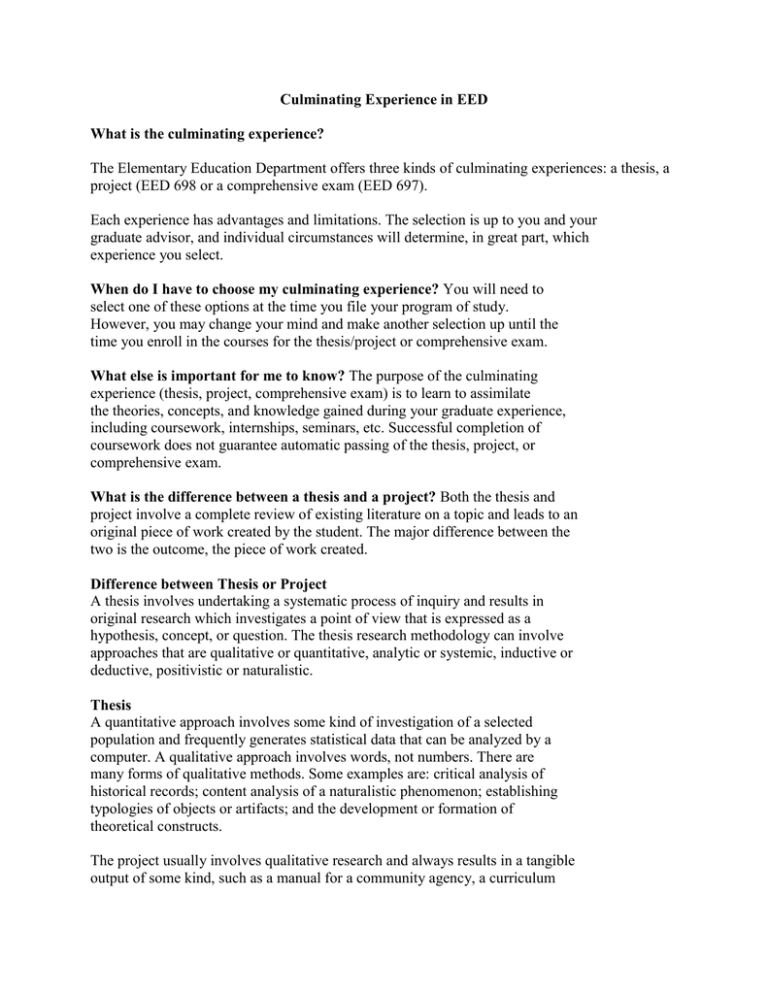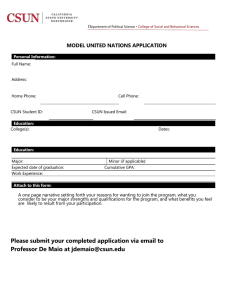Culminating Experience in EED
advertisement

Culminating Experience in EED What is the culminating experience? The Elementary Education Department offers three kinds of culminating experiences: a thesis, a project (EED 698 or a comprehensive exam (EED 697). Each experience has advantages and limitations. The selection is up to you and your graduate advisor, and individual circumstances will determine, in great part, which experience you select. When do I have to choose my culminating experience? You will need to select one of these options at the time you file your program of study. However, you may change your mind and make another selection up until the time you enroll in the courses for the thesis/project or comprehensive exam. What else is important for me to know? The purpose of the culminating experience (thesis, project, comprehensive exam) is to learn to assimilate the theories, concepts, and knowledge gained during your graduate experience, including coursework, internships, seminars, etc. Successful completion of coursework does not guarantee automatic passing of the thesis, project, or comprehensive exam. What is the difference between a thesis and a project? Both the thesis and project involve a complete review of existing literature on a topic and leads to an original piece of work created by the student. The major difference between the two is the outcome, the piece of work created. Difference between Thesis or Project A thesis involves undertaking a systematic process of inquiry and results in original research which investigates a point of view that is expressed as a hypothesis, concept, or question. The thesis research methodology can involve approaches that are qualitative or quantitative, analytic or systemic, inductive or deductive, positivistic or naturalistic. Thesis A quantitative approach involves some kind of investigation of a selected population and frequently generates statistical data that can be analyzed by a computer. A qualitative approach involves words, not numbers. There are many forms of qualitative methods. Some examples are: critical analysis of historical records; content analysis of a naturalistic phenomenon; establishing typologies of objects or artifacts; and the development or formation of theoretical constructs. The project usually involves qualitative research and always results in a tangible output of some kind, such as a manual for a community agency, a curriculum guide or an original design project. While the project may not involve an experiment, it may involve some limited statistical analysis, which may or may not involve a computer. The project always has an evaluation component; that is, the product you produce must be evaluated by a panel of experts, consumers or judges, as well as your project committee. Difference between a Graduate Thesis and Project Thesis Project Develops research and measurement skills in your area of specialization. Develops practical professional skills. May develop your computer skills and statistical knowledge. Increases library research skills and facilitates writing skills. Increases your library research techniques and facilitates your writing skills. May provide a service to the professional community. Is good preparation for doctoral work. Requires an oral defense. Requires an oral defense. Leads to possible professional presentations. Leads to possible publication with or without your advisor. Leads to possible professional presentations. Leads to possible publication of the product. Both the thesis and the project require an oral defense and an online submission for the final thesis/project. Guidelines for the Graduate Thesis or Project are found at: http://www.csun.edu/research-graduate-studies/thesisdissertation-guidelines Directed Comprehensive Examination in Elementary Education EED 697 Department of Elementary Education Policies for the Master of Arts Comprehensive Examination Candidates who have elected the Comprehensive Examination will register for EED 697 (See advisor for input) in the final semester of their master’s program. Generally, candidates should not be taking more than one other course during this semester. Registration is restricted so that each candidate must consult with the Graduate Coordinator regarding their eligibility, as well as to provide information on University graduation processes and timelines. The University policy states that the comprehensive exam, as the selected culminating activity in the degree program, must “test the range of subject matter covered in the student’s graduate program. The purpose of the comprehensive examination is to allow students to demonstrate their ability to integrate content knowledge, independent thinking, and critical analysis” (CSUN catalog 2012-2014, p.55). Students are eligible to attempt the examination during the semester in which other requirements for the degree have been completed or are in progress, including being fully Classified. In addition, the student should have applied for graduation with Graduate Admissions and Records. A Comprehensive Examination Committee (CEC), consisting of two department faculty members, one of whom serves as the Examination Instructor (Chair), supervises the examination of each student. In order to fully reflect the principles of the Department of Elementary Education and the Michael D. Eisner College of Education in promoting creative, critical, and reflective thinking and practice, in preparing graduates to assume service and leadership roles, and in valuing high standards in the acquisition and application of professional knowledge and skills in subject matter, pedagogy, and technology, Elementary Education graduate students will undergo both written and oral components of a comprehensive examination. The EED Comprehensive Exam is composed of two elements: (1) Written Portfolio of Significant Achievement and (2) Oral Conversation. Written Qualifying Exam Candidates for a Master’s degree will produce a Portfolio of Significant Achievement that will include artifacts showing evidence of significant products or performances from the candidate’s coursework over the Program of Studies. The commentary will contain five written reflections about how each artifact meets one of the SLOs. Elementary Education Department faculty will read two of the exam responses and provide formative feedback. A determination is made by this Graduate Committee with a third reader’s evaluation and the conclusion of the oral component of the comprehensive examination. The Comprehensive Examination Instructor then consults with each candidate regarding the results of the Examination. Oral Portfolio Conversation The Portfolio Conversation is the oral component of the Comprehensive Examination, which provides the candidate an opportunity to explain the evidence of meeting each of the Department Student Learning Outcomes and respond to questions about the key ideas found throughout the portfolios artifacts. In addition to the evaluation provided by the Instructor, a second reader from the Department of Elementary Education Faculty will review the Portfolio and provide written commentary and evaluation to the candidate. The oral component of the Exam will be scheduled for a one-hour Portfolio Conversation with a third faculty member in the College of Elementary Education. While the candidate will lead this conversation, it is expected that faculty will have read the Portfolio in advance and be prepared to ask questions or offer advice and comments. Such feedback will include recognition of strength, weakness, or most interesting evidence and reflection found in the portfolio, as well as advice for the candidate’s future professional development. Candidates will be notified by the Instructor (Chair) as to the outcome of the Exam. A report will be filed by the Graduate Coordinator following successful achievement of the Comprehensive Examination and a grade of Pass or No Pass for EED 697 will be assigned at the end of the semester. A candidate earning a passing grade on the Comprehensive Examination will be awarded the Master of Arts degree. Students who do not pass the Comprehensive Examination may re-take the examination one time in a subsequent semester. Students must be enrolled through regular enrollment in order to sit for the Comprehensive Examination. Important Resources for Selecting and Completing the Culminating Experience Graduate Studies Webpage: http://www.csun.edu/research-graduate-studies/graduate-studies Graduate Studies Handbook: http://www.csun.edu/sites/default/files/Graduate-Handbook-8.1.11.pdf Graduate Policies: http://www.csun.edu/research-graduate-studies/graduate-policies University Catalog: http://catalog.csun.edu/ Human Subjects (IRB): http://www.csun.edu/research-graduate-studies/human-subjects-research Research and Sponsored Projects: http://www.csun.edu/research-graduate-studies/research-and-sponsored-projects Thesis Information: http://www.csun.edu/research-graduate-studies/thesisdissertation-guidelines Thesis Formatting Guidelines: http://www.csun.edu/sites/default/files/Format-guidelines-7-2013.pdf ETD (Thesis Upload site): https://etd.csun.edu/ ETD Student Tutorial https://etd.csun.edu/studentTutorial.php CSUN Online Theses (Scholarworks): http://library.csun.edu/ScholarWorks/ Student Financial Opportunities: http://www.csun.edu/research-graduate-studies/funding-sources CSUN Virtual Software Library: http://www.csun.edu/it/mycsunsoftware-0 Kater Krafts (Thesis Binding): http://www.katercrafts.com/


